Luke Macfarlane ‘wouldn’t change anything’ about himself or Bros
Exclusive: The Bros star reveals why he finds watching the first gay rom-com ‘tough’, masc for masc, his take on the gay/straight actors debate and his passion for carpentry.
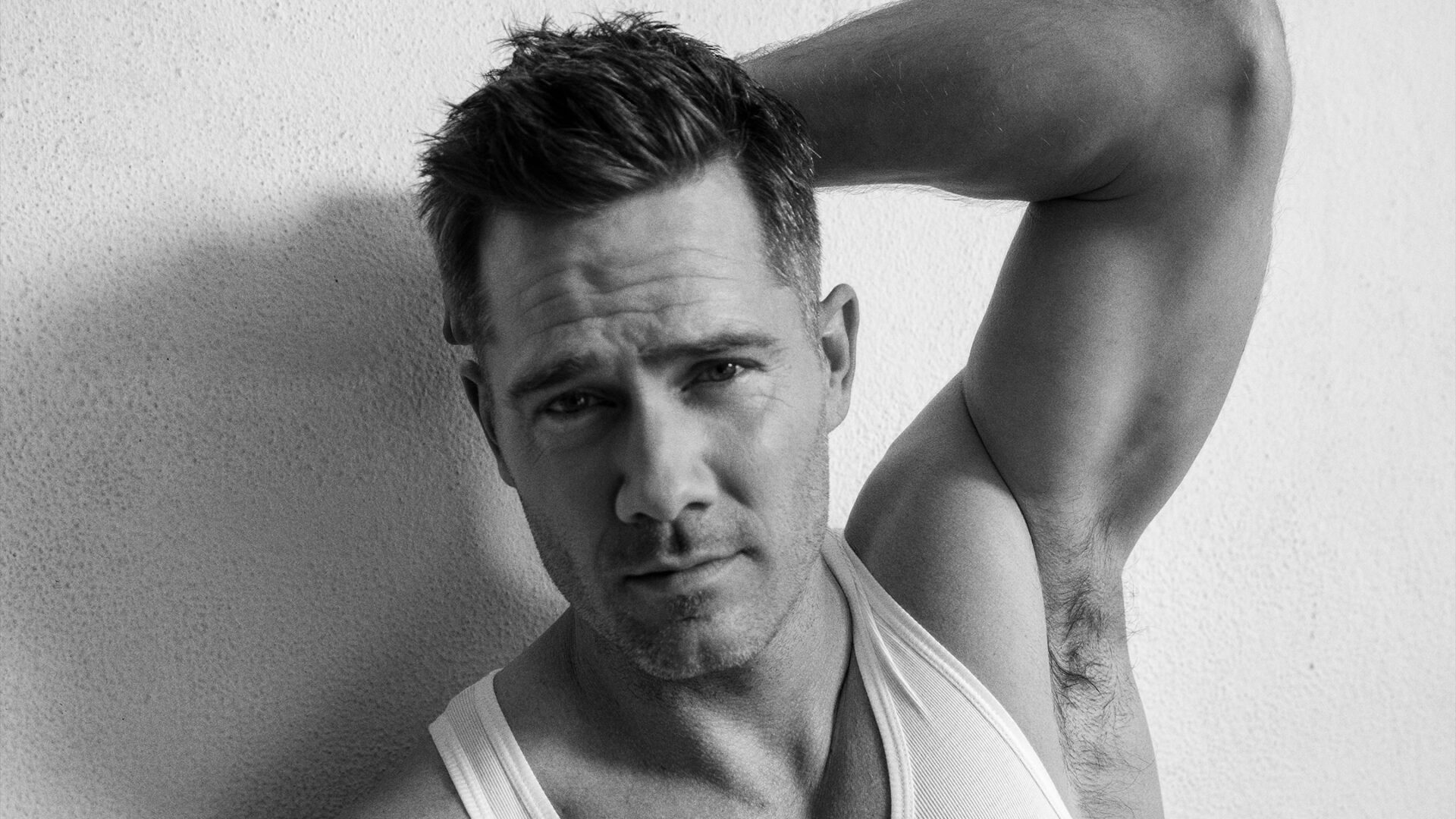
“Good morning,” says Luke Macfarlane cheerily as we log on to our Zoom call. For me, it’s late afternoon on a crisp autumnal day in October, while Luke is calling in from sunny Los Angeles. Clad in a dark baseball cap he confesses, “I just literally woke up and jumped on.”
Not that you’d guess this from his appearance – the 42-year-old Canadian actor and star of Bros looks as handsome as ever, with kind eyes, a warm smile, and a scruffy beard that’s giving off hot-daddy vibes. He doesn’t just look good, either; as I discover during our hour-long conversation, he’s charming, sensitive, and thoughtful, too. We don’t even talk about Bros – the film he’s here to promote – for 20 minutes. First, we discuss our feelings about needles (despite his fear of them Luke has just had dry needling to treat a gym injury). We also touch on Luke’s brief turn in the musical-comedy series Smash a decade ago (“It was so fun. I worked with Debra Messing before she worked with Billy. She didn’t remember that.”) and Luke’s skills as a carpenter.
A quick look at his Instagram will show you he’s quite the woodworker. From longbows and screen doors to babies’ cribs, I dare say Luke can make just about anything. His enthusiasm for it was kindled at a young age and he’s carried on the hobby in LA. “It’s a passion. As an actor, what we make is so ephemeral. So, doing something that’s permanent is very satisfying.” It’s also therapeutic, allowing Luke to shut himself off from the world.
“It’s also a time capsule,” he confides. “I’m always thinking about my father. When you cut open certain woods, they have a smell to them that takes you places. Over the pandemic, I built something out of teak. And teak has this incredible, wet, wild, jungly quality to it. I remember making something at the beginning of the pandemic. Now, whenever I smell teak, I’m taken back to those early pandemic days where everything was a little frightening. It was kind of like the jungle, so it’s that too, it’s connecting with these different tactile experiences.”
According to Michael Urie (Ugly Betty) – a classmate of Luke’s at the prestigious New York thespian training ground The Juilliard School – Luke’s skills are such that he even built his own house. “I didn’t build it from the ground up,” he clarifies. “My house was uninhabited for many years. I breathed life into it, which included building all the cabinets, framing, plumbing, and all that trim.” But he dreams of building his own place one day – perhaps back in his home country. “Canada does call me with its vast spaces and accommodating government. Somewhere a little more remote than I’m currently living.”
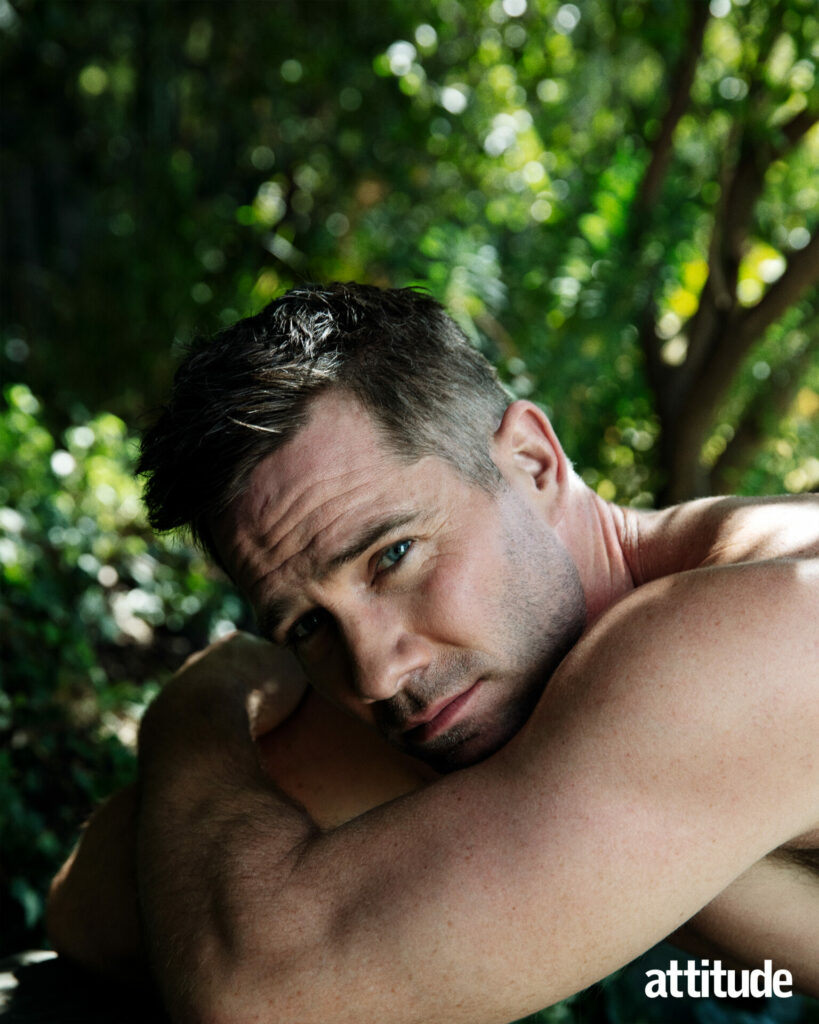
Luke discovered his love of acting in a roundabout way – through music. “I’ve played cello my whole life,” he tells me. “Acting was really a combination of my mom and dad saying, ‘You really know how to hold a crowd,’ and an English teacher that knew I could tell a monologue pretty well.” I ask what it was that made the teacher spot the X factor in him, and Luke remembers reading poetry in class one day. After a quick Google he finds that same poem, ‘The Love Song of J Alfred Prufrock’ by T.S. Eliot. “She said, ‘You knew what to do,’ which of course I didn’t.”
But there was clearly an instinct of how to perform, I suggest, and Luke says, “I remember as a cellist, I would sit on the outside of the orchestra so that people could see me play. Because that was almost more important than what I was actually playing,” he recalls. Always a showman then. “I guess so, which is hard for me to admit,” comes his modest reply.
Years later, Luke enrolled at Juilliard. As well as Urie, his contemporaries included Oscar-winner Jessica Chastain. Luke speaks of both in glowing terms. “We did scenes together; we did one from The Night of the Iguana. I’m still blown away by Michael and Jessica’s work, it’s incredible what they do.”
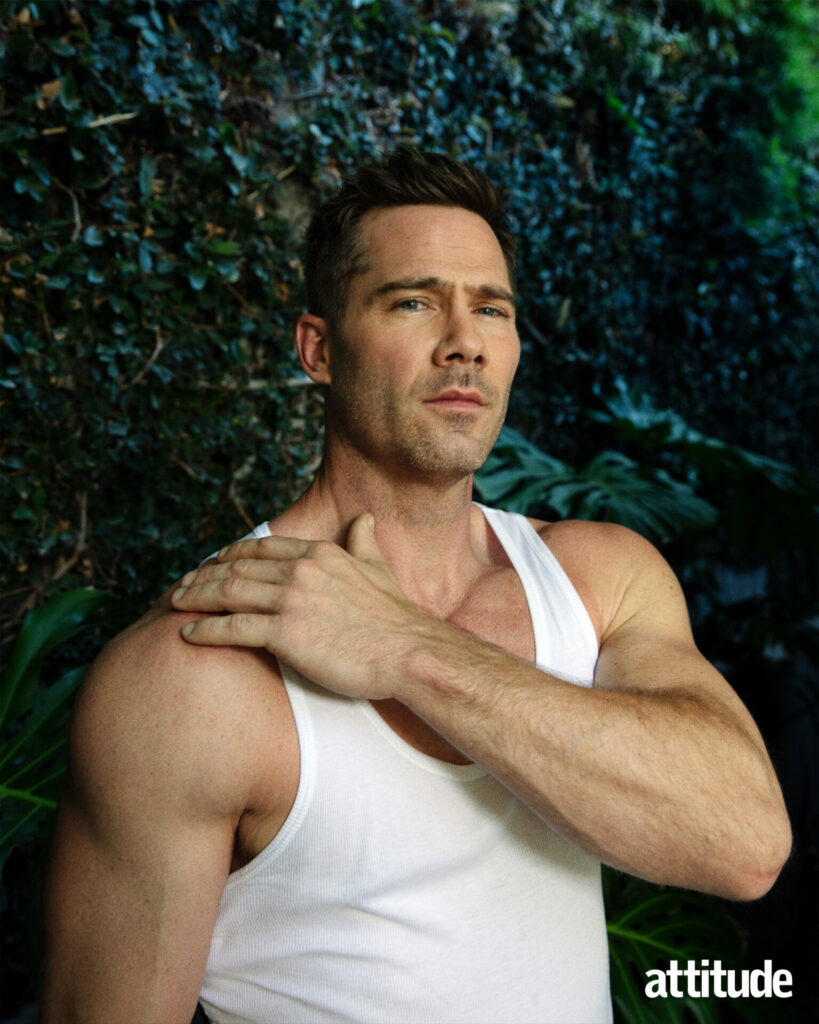
After Juilliard, Luke began building the career many young actors dream of. As well as working in theatre he had a leading part in the US-Iraq war drama, Over There, before scoring perhaps his best-known role as Scotty Wandell in the ABC family drama, Brothers and Sisters. Luke was promoted from a recurring cast member to main character after two seasons, the second of which ended with the history-making first gay wedding between series regulars on US TV when Scotty and Matthew Rhys’ character Kevin Walker got hitched in 2008. Luke came out publicly the same year.
Speaking to Canadian media outlet The Globe and Mail all those years ago, he voiced his concerns about the effect this would have on his career. Expanding on this earlier this year, he told Vanity Fair, “I can literally remember an agent once saying to me, ‘Superman can’t be gay’ – like just straight out.”
Luke doesn’t know what opportunities he may have missed out on as a result. Elaborating, he says, “At the higher level, I wasn’t getting the invitation to go into those spaces at all. Specifically, after I came out, too. And I was on a TV show. When I first graduated, I had a brief moment of, ‘Who is this kid?’ But after I came out publicly, that moment went away. I can’t say that there were times I was actually in the room and didn’t get the part. It was more about [not] getting the invitation to the dinner table.”
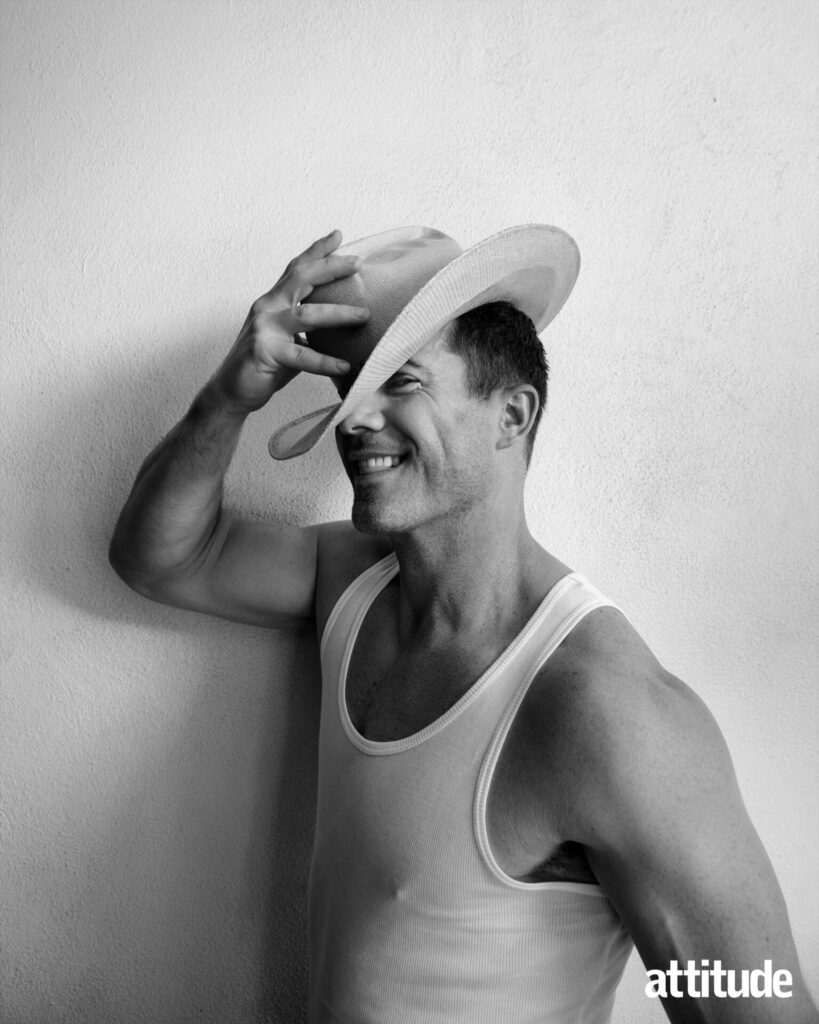
After Brothers and Sisters, Luke did a variety of theatre and TV work before becoming a darling of cable network Hallmark as one of its go-to leading men. He has notched up 14 films, with A Magical Christmas Village being his most recent. Although their mainstream family-friendly fare may not be for everyone, Luke’s grateful that the channel took a chance on him. He laughs off my awkwardness as I try and phrase this as a question that doesn’t slate Hallmark.
“I’ve been very proud of them. And it’s been good work,” he says. These parts, and the short-lived series Satisfaction – have also allowed him to quietly break the mould when it comes to openly gay actors playing straight roles – more of which later. But it’s not been – Luke accepts – in the mainstream. “They’re not on the same scale for sure.” More on that later.
Then came Bros, the first gay rom-com from a major Hollywood studio (Universal) which also features an all-LGBTQ principal cast – even in the straight roles. “It’s amazing that Universal with all its great might and power decided to throw itself behind something that is still gonna be tough to reach an audience,” says Luke showing off his delightfully crisp enunciation. “I certainly couldn’t have imagined it.”
In the film, Luke plays Aaron, a muscular, gym-going estate lawyer, who meets Billy Eichner’s nerdy and neurotic Bobby. Whereas Bobby lives out and proud, Aaron is more reserved. The two are very much opposites and spend much of the film debating this fact.
“Aaron’s somebody that thinks he has it all figured out,” comments Luke. “He thinks that having a good job, a nice apartment and a good body is all you need. One day, Billy asked me what kind of music I listen to, and I said country music. I’m a big fan of Garth Brooks. That became a line in the movie, that was something he found tremendously amusing.”
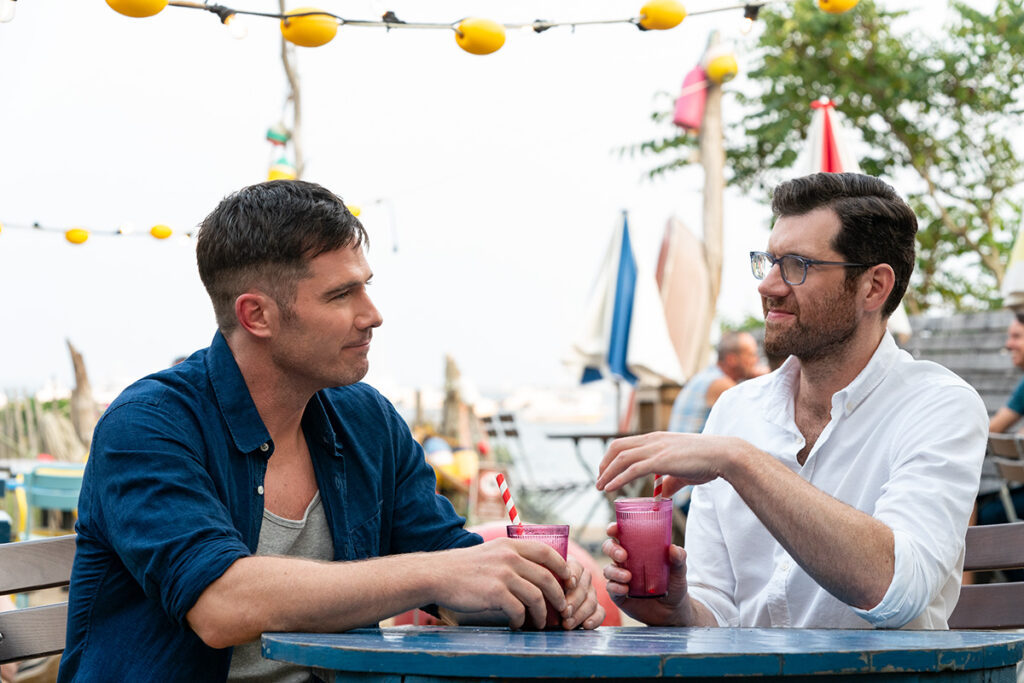
Billy, also the co-writer of Bros, wanted the character of Aaron had to embody the fascination within the gay community for the bro-y straight-passing, jock type. “He also had to have a lot of heart and keep Bobby on his toes, because Bobby can be intimidating. He couldn’t just have someone as his partner who he could steamroll over. From the second Luke walked out after that first audition, Judd [Apatow, producer], Nick [Stoller, director, and co-writer] and I just looked at each other and we were like, ‘That’s the guy.’ He’s not exactly Aaron. And I’m not exactly Bobby. But we both very much understand certain things those characters are going through.”
As an example of this, Luke shares: “There’s a moment in history that Aaron and myself lived through where sexual liberation doesn’t mean liberation. We got the right to go to a room full of shirtless guys and make out and take them home and not worry about getting sent to jail. That sexual liberation is important. And we did that. And Aaron’s out. But I think the other piece of it is the real work of the heart, to also feel love, and that is the harder part.”
“Watching Bros is tough for me. It reminds me of a part of myself.”
– Luke Macfarlane
Comparing Aaron to his previous role as Scotty, Luke decides that the major difference between them is that the former is less comfortable in their skin than the latter, who is more flirty, unashamed, and knows what he wants.
“In fact, watching Bros is tough for me,” he reveals. Referencing Aaron’s first scene in a gay bar where most people are topless, Luke says it was uncomfortable. “It reminds me of a part of myself. He [Aaron] was uncomfortable in his own skin, even though he looks the part and is seemingly popular. But yeah, the big difference is just how comfortable they are in their own skin, especially as it relates to their own sexuality in the world.”
Aaron’s forced toughness plays into something Luke calls “masculine drag”, which he says we see a lot with gym culture. “Wanting to seem tough, wanting to go, ‘Yes, I’m gay, but I’m also tough’. It’s the horrendousness of masc for masc. It’s a really damaging thing.” Pressure to act tough has only affected Luke once while working on Over There. “That was the only time I ever really suffered from trying to pretend I was something that I wasn’t when the camera wasn’t rolling. When Brothers and Sisters came along, I was like, ‘I don’t want to ever do that again.’ It’s not a way to work or to feel good about yourself.”
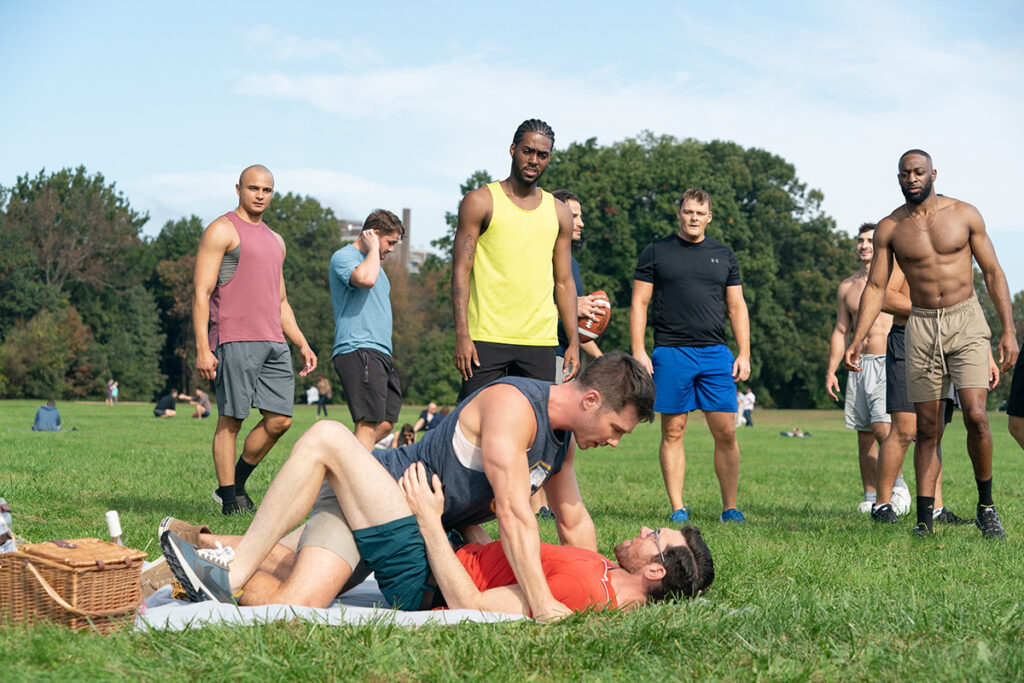
I ask if Luke felt he had to play Scotty a certain way to get mid-00s audiences to accept him (he says no – “that didn’t really equate into it”), and then we explore the love Brothers and Sisters fans felt for Scotty. From here, it’s a logical segue into the disappointing box-office figures Bros had upon its US release in September. On its opening weekend, it made a disappointing $4.8 million despite a budget of $22 million despite a hard push to reach mainstream cinema-goers.
Much has been made of this, with Eichner blaming homophobia. “Straight people, especially in certain parts of the country, just didn’t show up for Bros,” he said in now-deleted tweets. Many have offered their take on social media with some arguing that the film had tough competition. Others reference that Bros’ marketing targeted straight audiences and neglected its core gay audience, while some point to Eichner himself and the film’s lack of diverse leads.
Luke is pragmatic in his reaction. “As Judd has said, it’s the best-reviewed movie he’s ever made, and in all the metrics of audience appreciation, the scores, and data, it’s done very well. The box office was not, however, what I had hoped and dreamed it would be.”
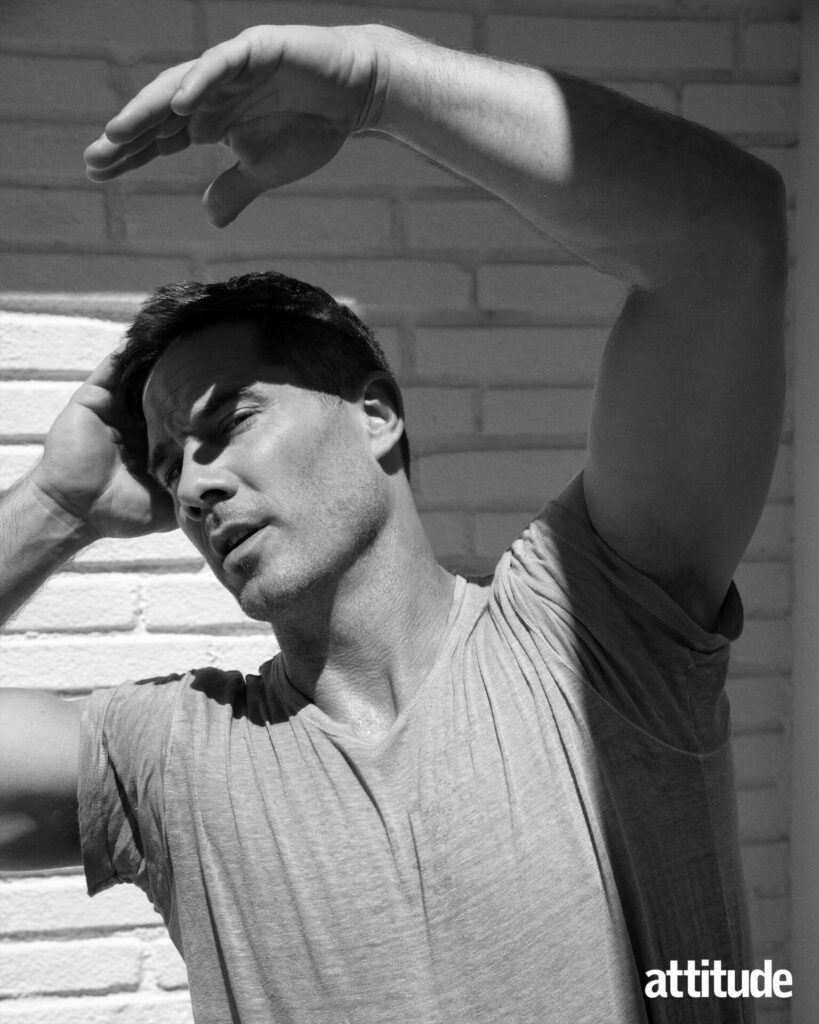
He then lists multiple reasons that could explain this, from it being a gay rom-com to audiences still being reticent to return to cinemas in the post-pandemic era. Taking a deep breath and shifting his cap slightly, he tells me with sincere honesty and no hint of defensiveness or guardedness, “I don’t know…” His disappointment is visible.
“I think it’s a really funny movie. Maybe we could have changed the marketing, but I don’t think it was that… Maybe it’s what we often say about living in a bubble because everybody I know really liked it. It’s a very big country, the United States.”
A valid point. In my screening, most people were laughing throughout. A personal standout line involves Beyoncé’s Lemonade album. Delicately, I ask what he makes of complaints about a lack of diversity. Although Bros has made a point of using mostly queer actors, and there is a varied cast of characters representing the LGBTQ community, the film is ultimately led by two cis-white gay men.
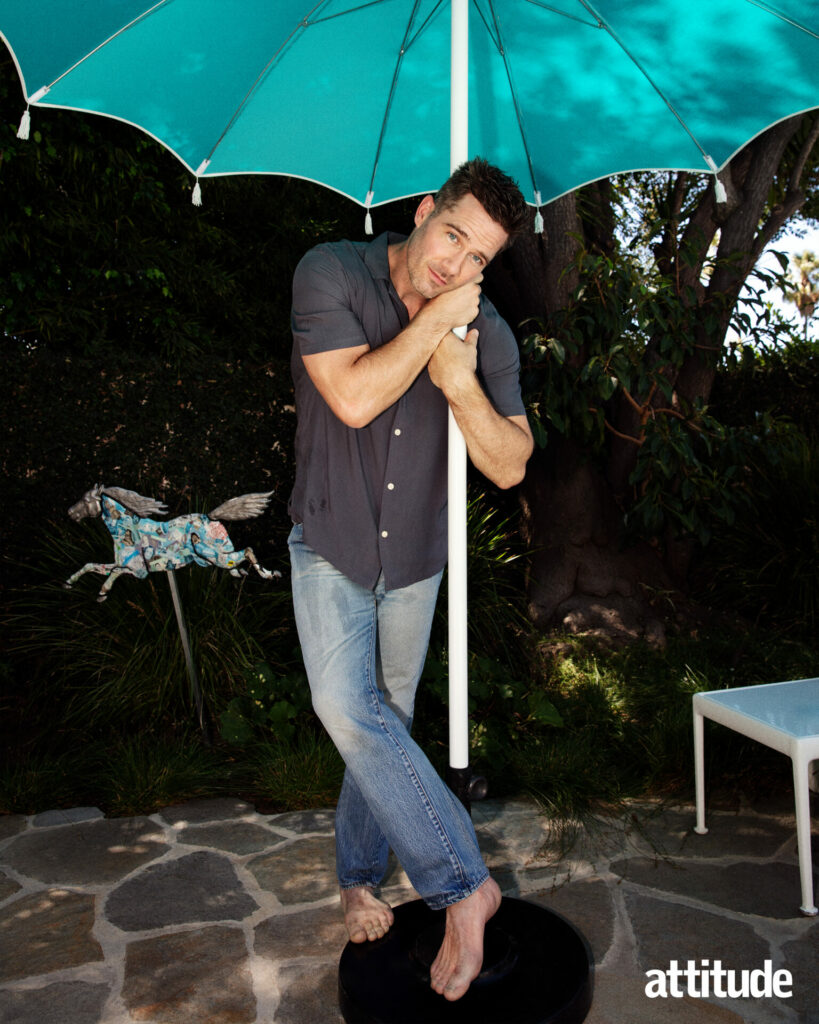
“I understand that completely. I think that Billy wrote a story that was personal to him. If it was a story about Billy Eichner dating a Black man or Latino man, I think he would not have been the guy to write that story, that’s all I can say. I think it would be very challenging for Billy to voice somebody that he doesn’t know.” It’s a fair and sensible conclusion and one can imagine how bad the backlash could have been.
As well as giving us a decent gay rom-com, the film introduces LGBTQ politics and discussions including representation, ageism, and internalised homophobia. Arguably, while these are all worthwhile topics, the film struggles to balance these with the rom-com plot. Pointing out that Bros had to make money, be funny, representative, and not offend people, Luke is philosophical, reasoning: “It needs to be everything. And in some parts, we came up a little bit shorter than we did in others. But that’s movie-making, that’s storytelling,” he says.
“We cannot address every single issue. There’s not enough time in the movie.” And while every point of view aired in the film may not be fleshed out, Luke reasons further that everything is treated sensitively while also trying to keep things humorous where appropriate. “We’re allowed to make fun of ourselves, which, to me, has always felt like a mark of inclusion, when you can be part of the joke.”
“I wouldn’t change anything about who I am or anything about the movie.”
– Luke Macfarlane
For all the critiques and discussions around Bros, it’s also received a large amount of support, with many praising Luke specifically. Perhaps too much is made of a movie’s financial success and less of its cultural impact? The very fact that a major studio has put out a film like Bros is reason to celebrate. Undeniably though, the system is dominated by the box office. Could the film’s box office success put off other studios working on similar projects?
“I can’t imagine it wouldn’t tell you the truth,” Luke admits. Certainly, though, he’s confident the movie will have an enduring influence and on a personal level, he is grateful to have been part of it. “Billy could have written it as a vehicle only for himself,” he says. “He wrote a real character for me that has got an arc. When I think back to other comedy films, the love interest never quite had as much to do. And it was tremendously generous that he gave an opportunity to another queer actor to also shine.”
Luke adds, “Like so many other aspects of living as an openly gay person, I don’t want to let metrics define how I fit into the conversation of success. I wouldn’t change anything about who I am or anything about the movie. That’s not defiance. That’s a confidence about the perspective I have to offer. It has a place.”
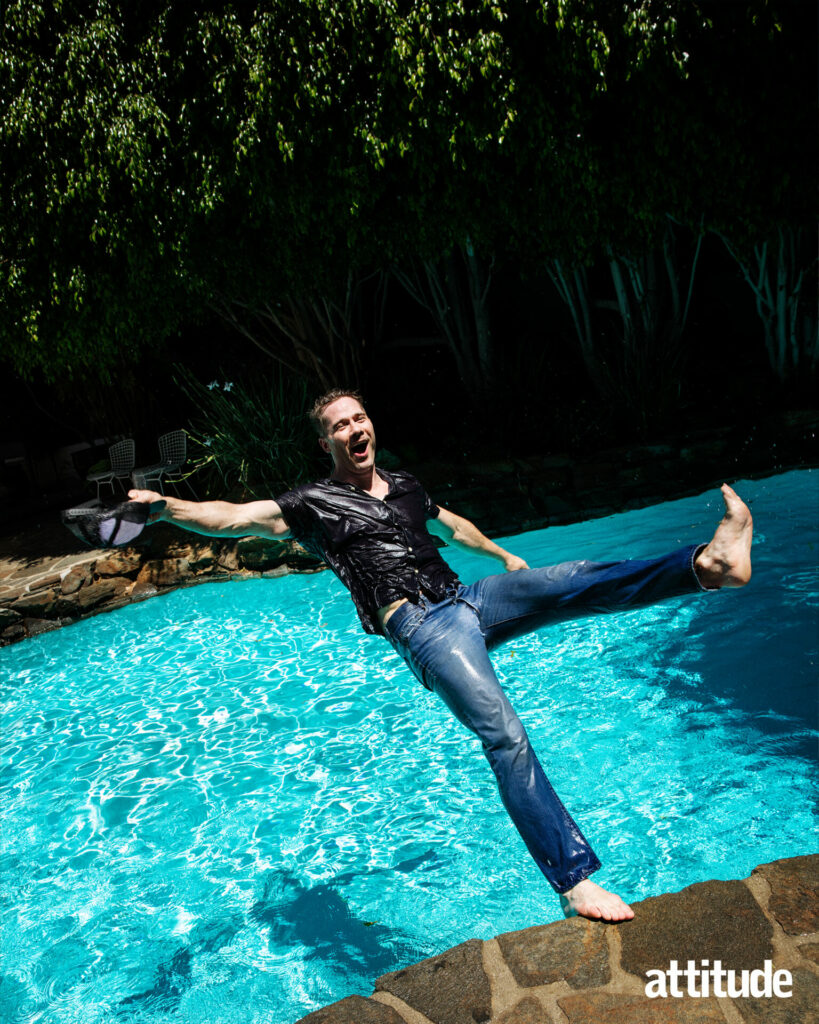
Following Bros, Luke was cast by Stoller in his upcoming Apple TV+ show, Platonic, where he will play Rose Byrne’s husband, once again proving that a gay man can play a straight part.
Giving his opinion on the controversial debate about who should portray queer roles, Luke is frank and even-handed. “I am very uncomfortable with putting rules down about who can play what in general. And the performances that I’ve seen of the straight male actors playing gay have been some of the most moving. As a young gay man watching Brokeback Mountain and being gutted watching Philadelphia with my father, and him understanding that America’s father, Tom Hanks, was able to inhabit something and give it so much dignity was so important.
“So, I would never want to say who can play what and I’ve said this before, but I’m super excited to see Bradley Cooper play [the late gay American conductor] Leonard Bernstein. It’s gonna be amazing. He’s the perfect guy to play that. And I don’t think he’s gay.”
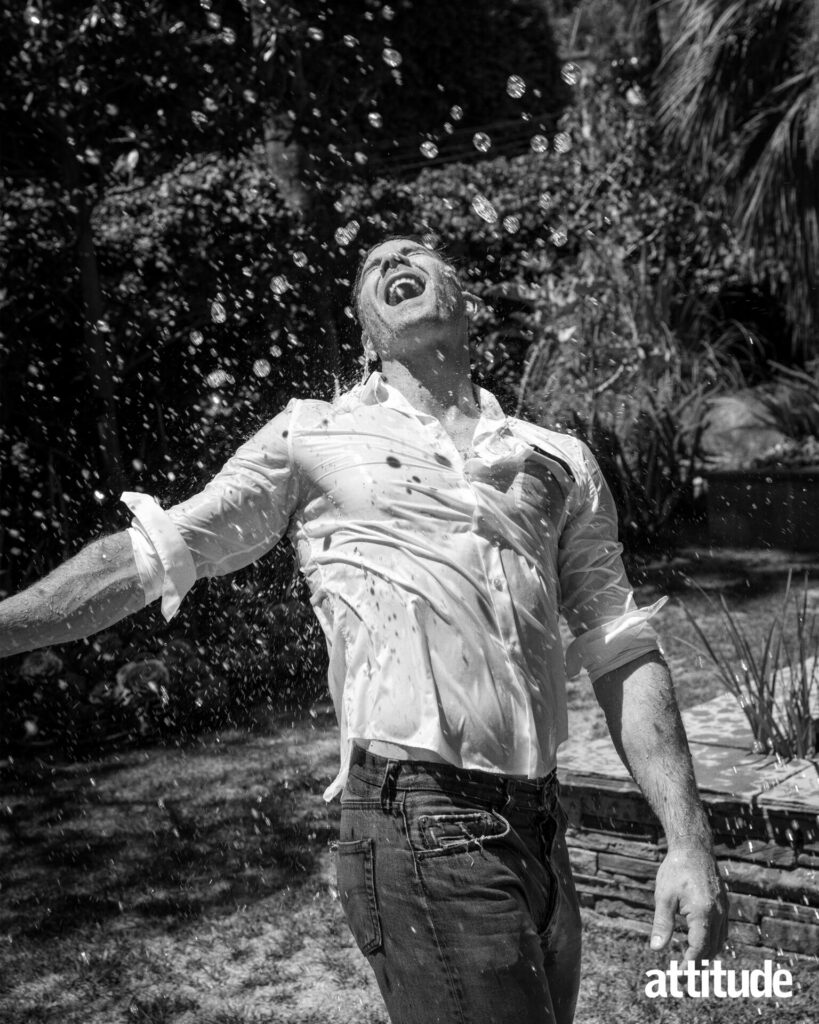
On the other side of the coin, while praising Luke’s performance in Bros, Stoller recently commented that he should play Captain America.
With the Marvel Cinematic Universe opening itself up to the possibilities of the multiverse it’s possible that someone new could don the star-spangled suit. Would Luke be interested? “Totally! 100 percent,” he enthuses. On whether audiences are ready for a gay Captain America, he is thoughtful.
“I would certainly try to do it. And that’s the interesting thing, too. Who knew that being an actor would become so much about my own identity? It turns out it’s very important to people. The question is, is America ready for a gay Captain America? Or is America ready for a gay actor playing a straight Captain America? I don’t know. We demand a lot of our public personalities and to know a lot about them. And I think that’s OK, to a degree, but we need to open our minds a bit.”
Words Alastair James Photography Doug Inglish Fashion Joseph Kocharian Grooming by Jason Schneidman at Soloartists
